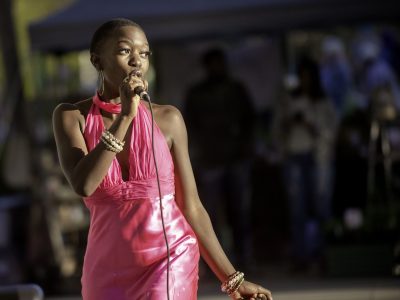by Jordan Green
If you were headed from the Cherry Street parking garage to the Millennium Center for Heavy Rebel Weekender last Saturday at about 8:45 p.m. you would likely have been diverted by the crackling honky-tonk sound of John Howie Jr. and his band, the Rosewood Bluff.
Performing on an outdoor stage at the intersection of Sixth and Trade streets for free, courtesy of the Downtown Winston-Salem Partnership, Howie and his band commanded the attention of a multigenerational crowd. The Mebane-based Howie is something of a heavy rebel himself — as stylized and unapologetic in his tastes as any of the pompadour-ed and tattooed rockabillies down the street.
With a laconic visage reminiscent of Hank Sr. and a baritone that conveys equal parts confidence and vulnerability, Howie has stuck to his guns for the past two decades. First with the Two Dollar Pistols and then with the Rosewood Bluff, he has remained true to honky-tonk — dance music for working people, a vessel for heartache and jagged promise, a sound designed to cut through the clink of bottles and loud conversations in a bar.
Aided by the irrepressible Billie Feather (who also plays with the bo-stevens) on upright bass and turn-on-a-dime drumming by Dave Hartman from Southern Culture on the Skids, Howie unleashed “Hello Trouble,” a tongue-in-cheek classic of the genre by Ernest Tubb. The next number, a cover of Buck Owens’ “Tiger by the Tail,” followed by two Howie originals — “The Wash Up” and “Last Great Guitar Slinger” — showed off the sparkling-clean tone of guitarist Tim Shearer, who also ably played tremolo parts in the stead of the band’s absent steel guitarist.
When a hapless bystander ignorant of the classic-country songbook shouted, “Play something we know,” Howie quipped, “That’s not likely to happen.”
As musical rebels go, Howie’s persona and music is about as family-friendly as a clean-and-sober Johnny Cash — think of the two albums he put out in 1969: At San Quentin and The Holy Land. The couple hundred or so people who turned out for the free concert listened appreciatively from rows of chairs lined up in three directions. The elderly and infirm sat in motorized wheelchairs near the front. Children danced by the stage, along with the odd couple or two.
At 9:10 p.m., the band abruptly vacated the stage when an electrical wire near a transformer caught fire. As a showstopper it wasn’t exactly Hendrix lighting up his guitar, but it carried its own drama.
While the honky-tonkers lamented the disintegration of family life in bars from Houston to Bakersfield from roughly 1947 to 1964, their demented cultural cousins the rockabillies were more or less reveling in it. The style and attitude that crystallized in 1957 — pompadours, sideburns, machismo, glorification of speed and power — built the touchstone for Heavy Rebel Weekender, a festival launched almost a half-century later.
The guys and gals roaming the stately corridors of the Millennium Center last weekend took the template — including Bettie Page haircuts and short dresses for women — and further toughened it with tattoos and facial piercings. Sleeveless flannel shirts, denim and overalls were all acceptable variations on the uniform. Hats might range from fedoras and porkpies to farm caps. Partially shaved heads, all good. Heavy makeup for women was fine, but not required.
The tough, rebellious aesthetic embraced by Heavy Rebel is supple enough to make room for ’60s garage rock, classic punk from the mid ’80s and metal, but its working-class stance maneuvers around hippie music — psychedelia, folk, the country rock of the early ’70s and, for that matter, Southern rock.
Demonstrating the essentials of style and attitude along with mutability of genre, the Spastiks of Brooklyn, NY played a feral set in one of the venues at the Millennium Center, aptly named the Underground, last Saturday. Ostensibly a rockabilly band with a singer named “the Beast with the Least” howling and snarling over a menacing rumble produced by an ensemble with an upright bass and hollow-body guitar and drums, their ferocity and volume leaned more towards punk.
The low ceilings and red lighting, combined with the music, gave the venue a hellish and claustrophobic feel. Empty PBR cans sailed through the air in both directions, and band and audience alike spat beer on each other — all in good fun. The rockabilly sound provided a platform for “My Baby Was Abducted by Aliens” and “The Upstairs View,” the band’s ode to upskirt voyeurism. But their aggression seemed more naturally attuned to the straight-ahead punk purveyed in their cover of Anti-Nowhere League’s “So What?”
Around the corner of the building, Bloodshot Bill’s set with the rhythm section dubbed the “Greensboro Gang” in the venue known as the Jailhouse was delayed slightly due to technical difficulties.
In looks, demeanor and voice, Bloodshot Bill resembles Edward G. Robinson, especially in his role as the snarling gangster in the 1948 noir film Key Largo. His pompadour, put together with his custom-made pomade Nice ‘n’ Greasy, became progressively more disheveled as he underwent a frenzy during his set last weekend. Once or twice he whipped out a comb and had his ’do back in form within seconds.
Bull-fiddle player Slim Perkins, who plays with the Tremors, and drummer Josh Johnson, aka Pinche Gringo, delivered studious and restrained rhythm backing, allowing the mellifluous qualities of Bill’s guitar playing and singing to come to the fore. The Montreal native, who has toured Europe and North America, slurred and yelped, whipped the crowd into a frenzy and bent his voice towards romance. His guitar playing, different from the hard twang of the Spastiks, warbled with emotional freight.
Some beer cans flew during Bill’s set too, albeit not as prolifically as they had for the Spastiks. Also indicative of the energy, good feeling and amorousness engendered by Bill’s music, several couples twirled on the dance floor in a scrum that evolved into a kind of mosh pit.
Hormonal, inebriated and soaked in shared good feeling, it was indeed a rock-rebel scene.
Join the First Amendment Society, a membership that goes directly to funding TCB‘s newsroom.
We believe that reporting can save the world.
The TCB First Amendment Society recognizes the vital role of a free, unfettered press with a bundling of local experiences designed to build community, and unique engagements with our newsroom that will help you understand, and shape, local journalism’s critical role in uplifting the people in our cities.
All revenue goes directly into the newsroom as reporters’ salaries and freelance commissions.






Leave a Reply